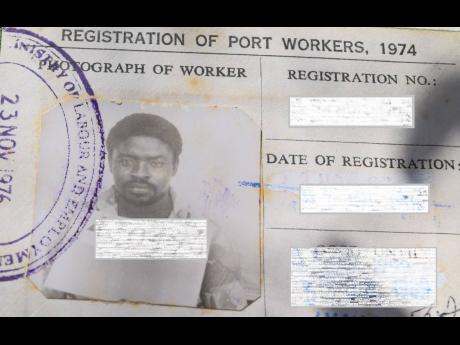Wongsetta Edwards: Reminiscing on 30 years as a port worker
Though retired for over two decades, Wongsetta Edwards vividly remembers his time working on the port of Kingston, especially in the early days of containerisation.
His 32-year stint began in 1966, a chance entry into the industry that was encouraged by a relative, who worked at the port then.
Edwards, who remains in touch with staff at the Shipping Association of Jamaica, shared memories of his early days with the shipping industry. “Well, I got involved because my uncle-in-law was working on the port, and he got me there in 1966 when they were taking on some new men because the old stock of port workers were going out, getting older, and some new guys were coming in.”
Edwards, who was 20 when he entered the industry, said he started out working the dock his first day, making his way on to a ship the second time he went to the wharf. From there, he moved to working at a warehouse for approximately three years before he began working on ships for Sealand. He eventually went on to become a trained crane operator and foreman.
“I had all kind of duties, because, at that stage, you worked everywhere because there was no container port at the time. So, you would work ship to dock; work in the warehouse. You would have work where you go to work at 8 o’clock in the morning and leave at 4 p.m., and you would [also] have work where you go at 7 in the morning and stop at 2 p.m., and from 2 p.m. till 9 p.m.”
He said that with the arrival of containerisation – the transportation of freight in containers – a graveyard shift was introduced, which saw them often working from 9 p.m. to 6 a.m. The containers made turnaround times faster, but the work remained strenuous.
“Sometimes, four, five nights for the week we don’t see bed,” Edwards said, adding that they would often cook and sleep at the port. “You get some rice, and go out a street and buy some fish and come back in and cook it inside, and we sit down and we eat and work. A couple of us who are still alive today, we nuh come out of the wharf, five night fi the week. Then Friday evening you run go home and come back. We were committed to it.”
Though difficult at times, he now laughs reflecting on some of the tough tasks he endured. “When you hear that a ship comes with 10,000 bags of rice and you have to go in the ship hold and load that on pallets ... that was the wickedest part of it.”
Safety at the port was always a concern, he noted, recollecting several incidents of people being hurt, some fatally, during accidents. Despite this, the importance of the job was not lost on him, and others.
“It’s like we were heroes who never know the dangers dem time deh, because we just do wah we have to do to make container port what it is today.”
Even with the challenges, he said, “I would do it all over again,” sharing the opportunities port work has provided him. “I don’t know of a better place to work because I came there at the age of 20. So, I think it’s the best place I have ever worked and will ever work.
“I get a house, mi send mi children them to school, which was successful for me, and I retired at the age of 52, and now I’m happily retired. And I have travelled a few places before I retired. The opportunity was there; I don’t think it’s at plenty places in Jamaica. It was one of the best place to work, and still the best for what it offered me in retirement.”
Edwards also offered some prudent advice for those looking to enter work at the port. “To come there now and think it’s a bed of roses, the advice I would give to a man, ‘If you are not prepared to go 24/7 and do the best, don’t bother take it. Don’t bother start.’ Because, at the moment, any job you have today, whether it’s paying a million dollars or not, you are privileged to have one now.”


